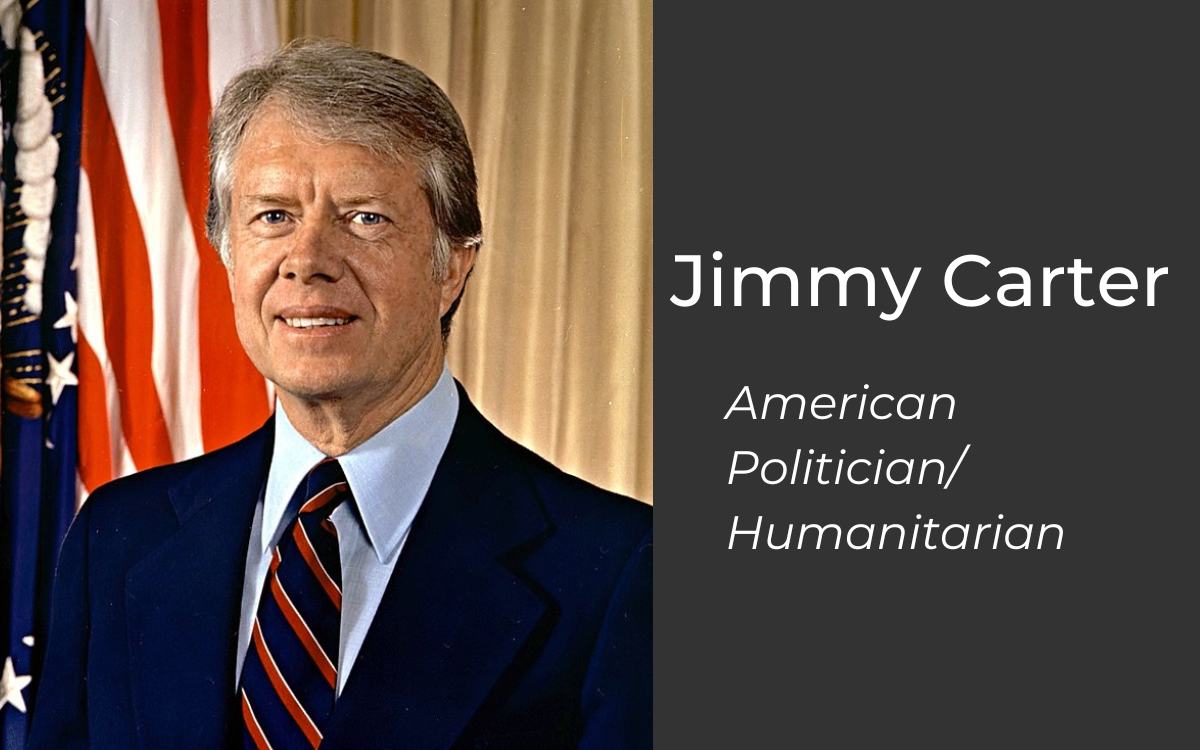Net Worth: Estimated to be around $13 million
Name: James Earl Carter Jr. (commonly known as Jimmy Carter)
Date of Birth: October 1, 1924
Place of Birth: Plains, Georgia, United States
College Attended: United States Naval Academy, Annapolis, Maryland
Nationality: American
Spouse Name: Eleanor Rosalynn Smith Carter
Marital Status: Married
Profession:
- Former U.S. President
- Naval Officer
- Farmer
- Humanitarian
- Author
Famous TV Shows/Movies/YouTube Channel: Appear on different shows
Instagram Handle: @jimmycarternps
Twitter Handle: @CarterLibrary
Introduction
Jimmy Carter, the 39th President of the United States, is a figure who has garnered respect both nationally and internationally. His life story is a compelling narrative that embodies the essence of the American Dream. This article delves deep into various facets of Carter’s life, including his net worth, educational background, complete biography, physical stature, and professional life.
Net Worth: A Modest Fortune with a Philanthropic Twist
Financial Beginnings
Early Years: The Farming Background
Jimmy Carter was born into a farming family in Plains, Georgia. His father, James Earl Carter Sr., was a successful businessman who ran a general store and invested in farmland. However, the family’s financial situation was modest, and Carter grew up in a setting that was far from luxurious. The family lived in a house that lacked electricity and indoor plumbing, which instilled in Carter the values of hard work, frugality, and humility from a young age.
- Family Business: Carter’s family owned a peanut farm, which became a significant part of his early life. He learned the intricacies of farming and business management, skills that would later serve him well.
- Economic Challenges: The Great Depression had a profound impact on the Carter family, as it did on many American families of that era. These challenging times further shaped his understanding of financial prudence.
Rise to Prominence: The Political Catalyst
Carter’s financial status began to change dramatically after he entered the political arena. His earnings as a state senator and later as the Governor of Georgia provided him with a stable income. However, it was his tenure as the President of the United States that marked a significant turning point in his financial journey.
- Presidential Earnings: As President, Carter earned a salary that, although not extravagant, was substantial. This was supplemented by various allowances and benefits, including a pension that he continues to receive to this day.
- Book Deals and Speaking Engagements: After leaving the presidency, Carter authored numerous books and became a sought-after speaker. These ventures not only enhanced his financial portfolio but also allowed him to donate generously to charitable causes.
Current Financial Status
According to multiple reliable sources, Jimmy Carter’s net worth is estimated to be around $13 million as of the most recent data. While this figure may not be staggering when compared to some of his presidential peers, it is a testament to his prudent financial management and ethical considerations.
- Investments: Carter has made some wise investments over the years, including in real estate and stocks, which have contributed to his net worth.
- Philanthropy: It’s worth noting that Carter has donated a significant portion of his wealth to charitable organizations and causes, further exemplifying his commitment to social responsibility.
Jimmy Carter’s financial journey is a compelling narrative of resilience, ethical choices, and prudent management. From his humble beginnings in a farming family to his rise as a global statesman, Carter’s financial life offers valuable lessons in integrity and responsibility.
Income Sources
Presidential Pension: A Lifelong Benefit
One of the most stable sources of income for Jimmy Carter is his presidential pension. According to federal law, former presidents are entitled to a pension that is equal to the pay of the head of an Executive Branch department. As of the most recent data, Carter receives an annual pension of $207,800. This pension not only provides him with a steady income but also reflects the nation’s gratitude for his service as the 39th President of the United States.
- Tax Implications: Like any other income, the presidential pension is subject to federal income tax, which Carter dutifully pays each year.
- Use of Pension: Carter has been known to use his pension responsibly, often allocating a portion of it to philanthropic endeavors through the Carter Center.
Secret Service Protection: A Necessary Expenditure
In addition to his pension, Carter is allocated an annual sum of $150,000 for Secret Service protection. This is a mandatory provision for all former presidents to ensure their safety and security.
- Scope of Protection: The Secret Service provides round-the-clock protection, which includes advanced security measures at his residence and during his travels.
- Budget Allocation: The $150,000 is part of a larger budget that covers not just the agents’ salaries but also other logistical aspects such as transportation and communication equipment.
Book Royalties: The Intellectual Capital
Jimmy Carter has authored numerous books on a variety of subjects, ranging from his political experiences to his views on social justice. These books have not only enriched public discourse but have also contributed to his income through royalties.
- Bestsellers: Some of his books have become bestsellers, generating significant royalty income.
- Range of Topics: Carter’s books cover an array of topics, including history, politics, and even poetry, showcasing his intellectual versatility.
Public Speaking: The Voice of Experience
Carter is a sought-after public speaker who commands respect and attention on both national and international platforms. While he does charge for these speaking engagements, he is known to donate a significant portion, if not all, of these earnings to charitable causes.
- High-Profile Events: Carter has spoken at various high-profile events, including academic symposiums, international conferences, and humanitarian fundraisers.
- Charitable Contributions: The earnings from his public speaking engagements often go directly to initiatives supported by the Carter Center or other charitable organizations.
- Jimmy Carter’s financial portfolio is a balanced mix of stable income and dynamic opportunities. His ethical approach to managing his finances—be it his pension, book royalties, or speaking fees reflects his lifelong commitment to social responsibility and personal integrity.
Educational Journey: The Bedrock of His Success
United States Naval Academy: A Prestigious Institution
Jimmy Carter’s educational journey took him to one of the most esteemed institutions in the United States—the Naval Academy in Annapolis, Maryland. Founded in 1845, the academy has a rich history of producing leaders who excel not just in military service but also in various other fields. Carter was no exception.
- Admission Process: Gaining admission to the Naval Academy is highly competitive, requiring not just academic excellence but also physical fitness and strong character. Carter met all these criteria, showcasing his well-rounded personality.
- Curriculum: The academy offers a rigorous curriculum that combines academic, physical, and ethical education. Carter majored in Physics and graduated with a Bachelor of Science degree, an accomplishment that laid a strong educational foundation for his future endeavors.
Naval Service: The Making of a Leader
The Naval Academy prepared Carter for a distinguished career in the U.S. Navy, where he specialized in submarine warfare. His time at the academy was not just about academic learning; it was also a formative period that instilled in him the values of discipline, leadership, and service to the nation.
- Training: As part of his training, Carter underwent intense sessions that included navigation, engineering, and weapons systems. This comprehensive training prepared him for the complex responsibilities he would later assume as a naval officer.
- Submarine Service: Carter served as a submariner, a role that is considered one of the most challenging in the Navy. He was initially assigned to the USS Pomfret and later served on the USS K-1, the USS Seawolf, and the USS Skate. His service included stints in both the Atlantic and Pacific Oceans.
- Rise in Ranks: During his naval career, Carter rose to the rank of lieutenant. His performance was marked by a series of commendations and awards, reflecting his competence and commitment.
- Nuclear Power Program: One of the highlights of Carter’s naval career was his selection for the U.S. Navy’s nascent nuclear submarine program, led by then-Captain Hyman G. Rickover. This experience gave him valuable insights into nuclear energy, a subject he would later deal with as President.
Jimmy Carter’s time at the United States Naval Academy and his subsequent naval service were instrumental in shaping him as a leader and a public servant. The skills, values, and experiences he gained during this period served as the bedrock upon which he built a life of service, integrity, and excellence.
Biography: A Tapestry of Achievements
Birth and Hometown
Jimmy Carter was born on October 1, 1924, in Plains, Georgia, a small town that would later become synonymous with his legacy. Plains was a tight-knit community where everyone knew each other, and it was here that Carter’s values of community service and humility were instilled.
- Cultural Background: Plains, Georgia, is situated in the Deep South, and Carter’s upbringing was deeply influenced by the culture and traditions of this region.
Parents: The First Influencers
Carter was the eldest son of Bessie Lillian Gordy and James Earl Carter Sr. His parents were not just caregivers but also his first role models.
- Father’s Influence: James Earl Carter Sr. was a businessman who ran a general store and was also involved in farming. He taught young Jimmy the value of hard work and integrity.
- Mother’s Impact: Bessie Lillian was a registered nurse who instilled in Carter a sense of compassion and the importance of community service.
Medical Facility: A Historic Birth
Interestingly, Carter holds the distinction of being the first U.S. President to be born in a hospital. This fact is often cited to underline the progressive mindset of his family, even during a time when home births were the norm.
Political Career: A Journey of Ascendancy
State Senator: The First Step
Carter’s foray into politics began when he was elected as a state senator for Georgia, serving from 1963 to 1967. This initial experience gave him a taste of legislative work and public service.
- Legislative Achievements: During his tenure, Carter focused on education reform and rural development, issues close to his heart given his own upbringing.
Governor of Georgia: Rising in Ranks
Carter served as Georgia’s 76th governor from 1971 to 1975. His governorship was marked by efforts to improve education, reduce racial segregation, and attract businesses to Georgia.
- Landmark Policies: One of Carter’s significant achievements as governor was the reorganization of the Georgia state government, making it more efficient and less segregated.
39th U.S. President: The Apex of Public Service
Carter’s ultimate political achievement was his election as the 39th President of the United States, serving from 1977 to 1981.
- Foreign Policy: Carter is perhaps best known for brokering the Camp David Accords, a peace treaty between Egypt and Israel.
- Domestic Initiatives: On the home front, Carter focused on energy conservation, healthcare reform, and civil rights.
Post-Presidential Life: An Unending Commitment to Service
Humanitarian Work: A Second Calling
After leaving the presidency, Carter could have easily retired to a life of leisure. Instead, he chose to continue serving humanity. He founded the Carter Center in 1982, focusing on global health, election monitoring, and human rights.
- Global Reach: The Carter Center has had a global impact, eradicating diseases and promoting democracy in various countries.
Nobel Peace Prize: Global Recognition
Carter’s relentless efforts in humanitarian work and peacebuilding were recognized when he was awarded the Nobel Peace Prize in 2002.
- Legacy: The Nobel Peace Prize cemented Carter’s legacy as not just a political leader but also as a global humanitarian.
Jimmy Carter’s life has been a tapestry of varied experiences, each contributing to the person he is today. From his early life in Plains, Georgia, to his extensive political career and ongoing humanitarian work, Carter remains a symbol of dedication, integrity, and compassion.
Physical Stature: More Than Just Numbers
Height
- Statistical Data: Jimmy Carter stands at a height of 5 feet 9.5 inches.
- Beyond Physicality: While not particularly tall, Carter’s stature in the realms of politics and humanitarian work is monumental.
Profession: A Multi-Faceted Career
Rank: The Journey to Lieutenant
Jimmy Carter’s naval career was marked by a steady rise through the ranks, culminating in his achieving the rank of lieutenant. This rank is not easily attained and is a testament to Carter’s skills, discipline, and leadership abilities.
- Training and Qualifications: To reach the rank of lieutenant, Carter underwent rigorous training and passed a series of evaluations and examinations. His responsibilities included not just technical naval duties but also leadership roles, requiring a blend of technical acumen and people skills.
- Role and Responsibilities: As a lieutenant, Carter was responsible for overseeing various operations and missions, ensuring the safety and effectiveness of his team. His leadership was marked by a commitment to excellence and an unwavering adherence to the Navy’s core values of honor, courage, and commitment.
Submarine Service: The Depths of Dedication
Carter specialized in submarine warfare, one of the most challenging and demanding areas of naval service. He served on several submarines, including the USS Pomfret, USS K-1, USS Seawolf, and USS Skate.
- Technical Expertise: Submarine service requires a deep understanding of complex machinery, navigation systems, and underwater tactics. Carter’s background in physics and engineering, honed at the Naval Academy, made him well-suited for this role.
- High-Stakes Environment: The nature of submarine warfare means operating in high-stakes, high-pressure environments. Carter’s ability to make sound decisions under pressure was a key factor in his success in this specialized field.
Farmer: The Roots of Practical Wisdom
Peanut Farm: A Lesson in Economics and Management
Before venturing into politics, Carter managed his family’s peanut farm in Plains, Georgia. This experience was not just an economic endeavor but also a formative period in his life.
- Business Acumen: Managing a farm is akin to running a small business. Carter had to deal with everything from crop rotation and irrigation to marketing and sales, gaining valuable business insights in the process.
- Economic Sustainability: Carter implemented modern farming techniques to increase yield and profitability. His experience on the farm taught him the importance of sustainable practices, both economically and environmentally.
Humanitarian: A Lifelong Commitment to Global Welfare
Carter Center: A Beacon of Hope and Change
In 1982, Carter founded the Carter Center, a non-profit organization with a mission to improve global health, protect human rights, and promote democratic governance.
- Global Health Initiatives: One of the Carter Center’s most notable achievements is its work in eradicating diseases like Guinea worm disease and improving mental health care globally.
- Human Rights Advocacy: The Center also plays a crucial role in advocating for human rights, often sending observers to monitor elections and ensure they are free and fair.
- Democratic Governance: The Carter Center has been instrumental in promoting democracy, often facilitating dialogues between conflicting parties to foster peace and democratic governance.
Each of these professional roles naval officer, Farmer, and Humanitarian contributed uniquely to shaping Jimmy Carter as a multi-faceted individual. His experiences in these diverse fields endowed him with a rich tapestry of skills and perspectives, making him one of the most versatile and accomplished figures in American history.
Family Life: The Pillar of His Success
Spouse
- Rosalynn Carter: His wife has been his steadfast supporter and advisor.
- First Lady: During her time as the First Lady, Rosalynn was actively involved in social causes and was her husband’s most trusted advisor.
Children and Grandchildren
- Four Children: The Carters have four children Amy, Jack, Chip, and Jeff.
- Extended Family: These children have given them a total of 22 grandchildren and great-grandchildren, making for a large and close-knit family.
Conclusion
Jimmy Carter’s life is a rich tapestry woven with threads of dedication, hard work, and an unwavering commitment to human welfare. His financial worth may be quantifiable, but his contributions to society are invaluable. As he continues to age gracefully, Carter remains a living testament to the enduring spirit of American resilience and philanthropy.




